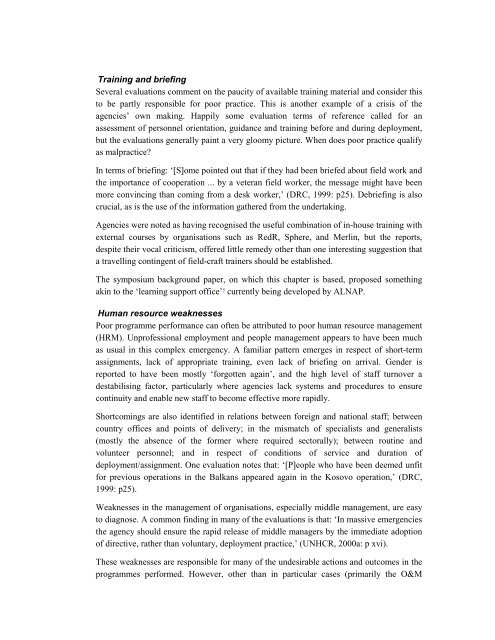Download PDF - ReliefWeb
Download PDF - ReliefWeb
Download PDF - ReliefWeb
You also want an ePaper? Increase the reach of your titles
YUMPU automatically turns print PDFs into web optimized ePapers that Google loves.
Training and briefing<br />
Several evaluations comment on the paucity of available training material and consider this<br />
to be partly responsible for poor practice. This is another example of a crisis of the<br />
agencies’ own making. Happily some evaluation terms of reference called for an<br />
assessment of personnel orientation, guidance and training before and during deployment,<br />
but the evaluations generally paint a very gloomy picture. When does poor practice qualify<br />
as malpractice?<br />
In terms of briefing: ‘[S]ome pointed out that if they had been briefed about field work and<br />
the importance of cooperation ... by a veteran field worker, the message might have been<br />
more convincing than coming from a desk worker,’ (DRC, 1999: p25). Debriefing is also<br />
crucial, as is the use of the information gathered from the undertaking.<br />
Agencies were noted as having recognised the useful combination of in-house training with<br />
external courses by organisations such as RedR, Sphere, and Merlin, but the reports,<br />
despite their vocal criticism, offered little remedy other than one interesting suggestion that<br />
a travelling contingent of field-craft trainers should be established.<br />
The symposium background paper, on which this chapter is based, proposed something<br />
akin to the ‘learning support office’ 5 currently being developed by ALNAP.<br />
Human resource weaknesses<br />
Poor programme performance can often be attributed to poor human resource management<br />
(HRM). Unprofessional employment and people management appears to have been much<br />
as usual in this complex emergency. A familiar pattern emerges in respect of short-term<br />
assignments, lack of appropriate training, even lack of briefing on arrival. Gender is<br />
reported to have been mostly ‘forgotten again’, and the high level of staff turnover a<br />
destabilising factor, particularly where agencies lack systems and procedures to ensure<br />
continuity and enable new staff to become effective more rapidly.<br />
Shortcomings are also identified in relations between foreign and national staff; between<br />
country offices and points of delivery; in the mismatch of specialists and generalists<br />
(mostly the absence of the former where required sectorally); between routine and<br />
volunteer personnel; and in respect of conditions of service and duration of<br />
deployment/assignment. One evaluation notes that: ‘[P]eople who have been deemed unfit<br />
for previous operations in the Balkans appeared again in the Kosovo operation,’ (DRC,<br />
1999: p25).<br />
Weaknesses in the management of organisations, especially middle management, are easy<br />
to diagnose. A common finding in many of the evaluations is that: ‘In massive emergencies<br />
the agency should ensure the rapid release of middle managers by the immediate adoption<br />
of directive, rather than voluntary, deployment practice,’ (UNHCR, 2000a: p xvi).<br />
These weaknesses are responsible for many of the undesirable actions and outcomes in the<br />
programmes performed. However, other than in particular cases (primarily the O&M
















![CynefinFramework final [Read-Only]](https://img.yumpu.com/19017304/1/190x135/cynefinframework-final-read-only.jpg?quality=85)